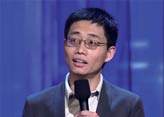American students chase China dream
Updated: 2011-01-21 08:06
By Chen Jia and Lu Chang (China Daily)
|
|||||||||
A pre-study period in one of the institutes provides valuable insights and helps foreign students to later study in China at lower costs and with fewer language difficulties.
The number of foreigners studying in China hit a record 240,000 in 2009, figures released earlier by the ministry showed.
There are plans to increase the number to 500,000 by 2020 through bilateral educational cooperation programs launched in 2010.
Rebekah Aremo, a sophomore at the University of Detroit Mercy, participated in an exchange program in 2007 and came to study Chinese at the University of International Business and Economics in Beijing for a year.
"I expected China to be interesting. And that's exactly what I found here - an interesting country," Aremo said.
"There were a lot of stereotyped views of China at that time. Many Americans thought the Chinese all eat rice, practice taiji and like kungfu, and that's all they knew about China," she said.
"I was very suspicious of these simplified and narrow stereotypes. I (thought) there must be more diversity in such a big country."
After returning to Detroit, Michigan, in 2009 to finish her bachelor's degree, Aremo returned to Beijing for another year of intensive Chinese-language study.
In September 2010, she started an enterprise management master's program at the University of Science and Technology Beijing.
Aremo was the only foreigner in the class. She got along well with her classmates because of her fluency in Chinese and easygoingness, she said.
The 23-year-old also traveled throughout the country during the past few years, gaining a better understanding of its diversity and complexity, she said.
"I have worked hard and made the best of my stay in China. Now it's time to put my skills and the abilities I've learned in school into practice," Aremo said.
"I want to work soon. A friend and I are considering starting a partnership based in China to organize international exchange programs."
Li Yao contributed to this story.











